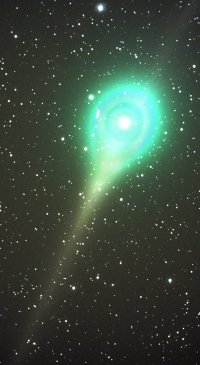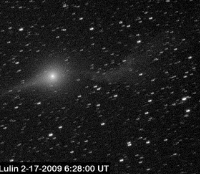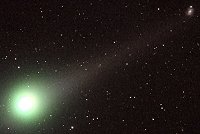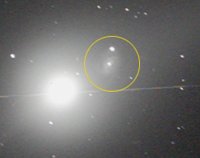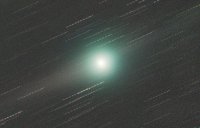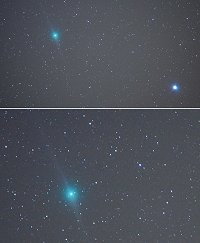
| Summary: Following its close encounter with Earth on Feb. 24th, Comet Lulin (C/2007 N3) is moving away and slowly dimming. [full story] [ephemeris] [3D orbit] [finder charts: Jan.11-Feb.20, Feb.20-Mar.21] |
| Go to Page 1 | 2 | 3 | 4 | 5 | 6 | 7 | You are viewing Page 8 | Go to Page 9 | 10 | 11 | 12 | 13 | 14 | 15 | 16 | 17 | 18 | 19 |
| COMET LULIN BRIGHTENS--VISUAL REPORTS: "Today, Feb. 17th at 4 am, I observed the comet with my 3.5-inch refractor," reports Mariano Ribas of Buenos Aires, Argentina. "It is much brighter than it was just a few nights ago. I estimate the magnitude at +5.6. If this brightening continues, Lulin could reach magnitude +5.0 or even brighter during its closest approach next week." "I observed comet Lulin before dawn this morning, Feb. 17th, and I found it in an instant using 10x50 binoculars," says Martin Mc Kenna of Maghera, N. Ireland. "The comet was very bright and large with a coma 20 arcminutes in diameter. Despite the glare of the last quarter Moon, I was very impressed to see the comet easily with the naked eye with even a hint of green colour. From a dark country site, Lulin should be an easy naked-eye object, a view which can only get better at close approach to Earth." "Lulin is bright and it is moving fast!" adds Fredrik Broms of Kvaløya, Norway. "On Feb. 17th the comet was easily detected in a simple pair of 8x42 binoculars, and with a bit of patience it could just be made out with the naked eye. The comet moved a noticable amount during my 4-hour observing session."
more
images:
from
Arthur Stevens of Port Richey, Florida; from
Willian Souza of Sao Paulo, Brazil; from
Guilherme Grassmann of Americana, São Paulo, Brasil;
from
Pitterle Markus of Heinfels, Austria, Europe; from
Martin Mc Kenna of Maghera, Co. Derry, N. Ireland; from
Fredrik Broms of Kvaløya, Norway; from
Aga Boron of LaGrange, North Carolina; from
Andrea Mantero of Bernezzo, Italy |
